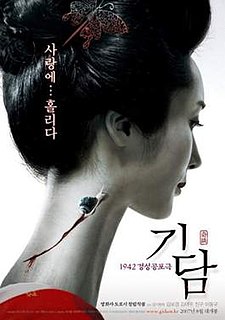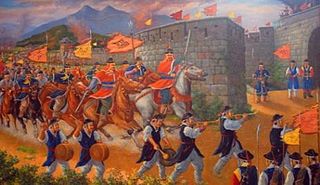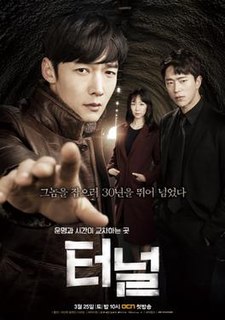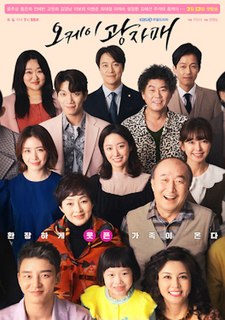
Korean philosophy focused on a totality of world view. Some aspects of Shamanism, Buddhism, and Neo-Confucianism were integrated into Korean philosophy. Traditional Korean thought has been influenced by a number of religious and philosophical thought-systems over the years. As the main influences on life in Korea, often Korean Shamanism, Korean Taoism, Korean Buddhism, Korean Confucianism and Silhak movements have shaped Korean life and thought. From 20th century, various Western philosophical thoughts have strongly influenced on Korean academia, politics, and daily life.
Yi Su-gwang or Sugwang (1563–1628), also known as Lee Soo-kwang, was a Korean sarim, a military official, and a diplomat of the Joseon Dynasty. He was also an academic and an encyclopedist who compiled the Jibong Yuseol, the earliest Korean encyclopedia.

Epitaph is a 2007 South Korean film directed by brothers Jung Sik and Jung Bum-shik. The film is a horror film set primarily in 1942, while Korea was under the colonial rule of Japan. It is framed by scenes set in 1979.
Jibong yuseol is a Korean encyclopedia written by Yi Su-gwang. It was published in 1614 during the reign of King Gwanghaegun. The author was a silhak scholar and a military officer of the mid-Joseon period of Korea. The title came from his pen name, Jibong and yuseol which literally means "topical discourses" in Korean.
Chang Sik Kim was a South Korean Buddhist master. He was born in Korea in 1944. When he was thirteen he met his teacher, Seung Sahn Lee, and entered the Hwa Gye temple in Seoul. When Kim was 21, his teacher sent him on a 100-day meditation retreat. During this retreat the art of Shim Gum Do was revealed to Kim through his meditation and he attained Mind Sword enlightenment.
Shim Gum Do, translated as the "mind sword path", is a Korean Martial Art and style of Korean Swordsmanship of recent invention, originating in Korea.

When Romance Meets Destiny is a 2005 South Korean romantic comedy about two brothers and their different approaches to love.

Min Yeong-chan, was scion of the powerful Min clan of the late Joseon period in Korea. Along with his elder brother Min Yeong-hwan, Yeong-chan served in a number of official positions towards the end of the Joseon dynasty. In 1900, he served as a Korean commissioner to the Paris Universal Exposition.
Kwang, also spelled Gwang, is a Korean given name and name element. The meaning differs based on the hanja used.
Song Jun-gil, also known by his nickname Dongchundang, was a Korean politician and neo-Confucian scholar of the Joseon Dynasty.

Yi Bok-nam was a Korean naval commander and politician of the Joseon Dynasty. He passed the military examination and attained the position of Byeongmajeoldosa for Jeolla Province. He served against the Japanese navy during the Imjin war. His courtesy name was Subo.

Lyuh Woon-hyung or Yo Un-hyung was a Korean politician who argued that Korean independence was essential to world peace, and a reunification activist who struggled for the independent reunification of Korea following its national division in 1945.
Kwang-sik, also spelled Kwang-shik or Gwang-sik, is a Korean masculine given name. Its meaning differs based on the hanja used to write each syllable of the name. There are 13 hanja with the reading "kwang" and 16 hanja with the reading "sik" on the South Korean government's official list of hanja which may be registered for use in given names.

Man to Man (Korean: 맨투맨) is a 2017 South Korean television series starring Park Hae-jin, Park Sung-woong, Kim Min-jung, Chae Jung-an and Yeon Jung-hoon.

Happy Home is a 2016 South Korean television series starring Kim Yeong-cheol, Won Mi-kyung, Kim So-yeon, Lee Sang-woo and Lee Pil-mo. It aired on MBC every Saturdays to Sundays at 20:45 (KST) for 51 episodes from February 27 to August 21, 2016.
The Battle of Yongin was a battle that happened during the Japanese invasions of Korea. The battle was fought from June 5-6, 1592. Yi Gwang's force of 80,000-130,000 lost to the numerically inferior Japanese garrison of 1,600-1,900.

Tunnel is a 2017 South Korean television series starring Choi Jin-hyuk, Yoon Hyun-min and Lee Yoo-young. It replaced Voice and aired on cable network OCN on Saturdays and Sundays in the 22:00 (KST) time slot from March 25 to May 21, 2017 for 16 episodes. The series was inspired by the Hwaseong serial murders.

The Jeonju Yi clan is a Korean clan with the surname Yi. Their Bon-gwan is in Jeonju, North Jeolla Province. The clan includes the former imperial House of Yi.

Revolutionary Sisters is a South Korean television series starring Hong Eun-hee, Go Won-hee and Jeon Hye-bin. Directed by Lee Jin-seo, the weekend drama revolves around the Lee family, who are suspected of murder of the mother during divorce proceedings of their parents. It was premiered on KBS2 on March 13, 2021, and airs on every Saturday and Sunday from 19:55 (KST).










